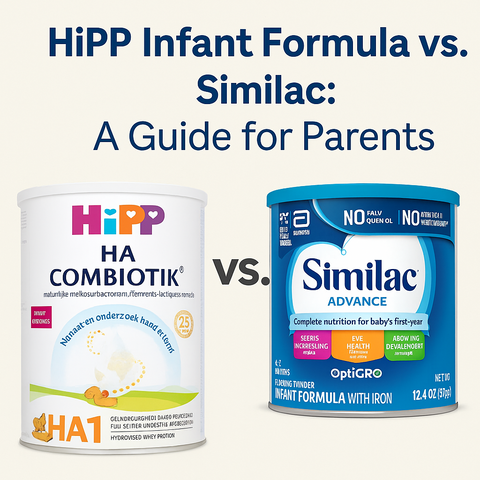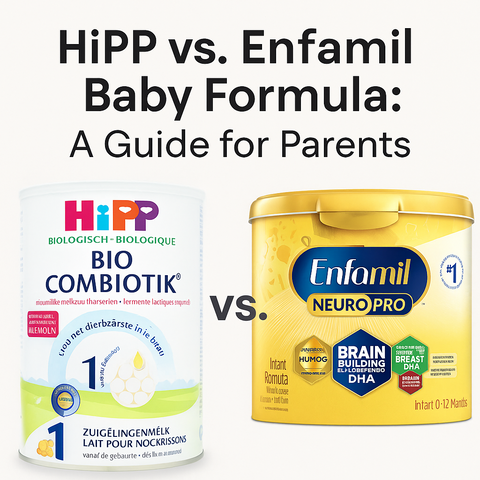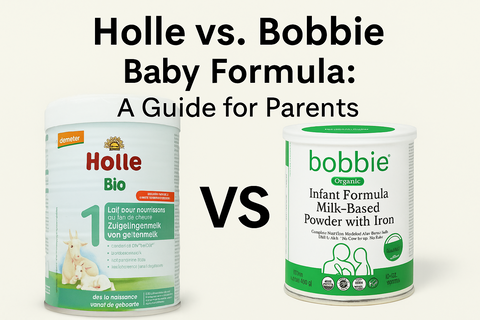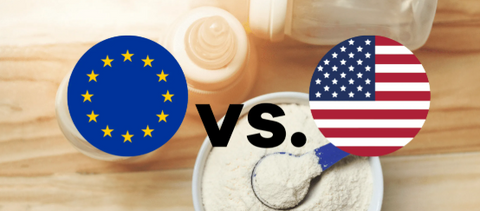Understanding Whey and Casein Proteins in European Infant Formula
Navigating the world of baby formulas can be overwhelming. With so many options available, understanding the ingredients—especially the protein content—is key to making an informed choice. Parents often overlook the whey-to-casein ratio, which significantly impacts a baby's digestion, growth, and overall health. In this article, we will explore the essential components of infant formula, focusing on the significance of protein types—whey and casein—while guiding you through the complexities of selecting the best formula for your little one.
What Are Whey and Casein?

Whey and casein are two types of protein found in both breast milk and the milk of most mammals, including cows and goats. These proteins are the primary sources of routine infant formulas designed to meet your baby's nutritional needs.
Though both human and cow's milk contain whey and casein, the proteins differ significantly in composition and function. While some infant formulas aim to mimic the whey-to-casein ratio in breast milk, there's more to the science than just ratios. Formula manufacturers consider not only the whey-to-casein ratio but also each protein's structure, composition, and digestibility, creating balanced formulas to support healthy infant development.
Why Protein Matters in Baby Formula
Protein is a significant component of infant nutrition and is crucial for growth, development, and overall health. European Baby Formulas can contain various protein types, from cow's milk to hydrolyzed proteins. However, unless your pediatrician recommends a specialty formula, your baby will likely well-tolerate a regular cow or goat formula containing whey and casein proteins. Let's review the role of Whey and Casein, how whey and casein are both similar and different, and why the balance between these proteins in baby formula matters.
The role of Whey
Here are the key benefits and characteristics of whey protein in infant formula:
- Gentle Digestion: Whey remains liquid during digestion, which helps ease common infant issues like gas, fussiness, and stomach discomfort.
- Supports Growth and Development: All essential amino acids needed for healthy growth, including branched-chain amino acids crucial for muscle and tissue development.
- Mimics Breast Milk: Many formulas use a similar whey-to-casein ratio found in breast milk, especially in early stages, to support an infant's nutritional needs.
- High Biological Value: Whey protein is a complete, high-quality protein, which means it provides optimal nitrogen retention, making it well-suited for nourishing infants.
- Helps Build Immunity: Whey proteins include immunoglobulins and lactoferrin, which may help support babies' immune function.
The Role of Casein

Here are the key benefits and characteristics of the casein protein in infant formula:
- Slow and Steady Digestion: Casein forms curds in the stomach, which slows digestion, helping babies feel fuller for extended periods.
- Supports Bone Health: It binds essential minerals like calcium and phosphorus, crucial for developing strong bones and teeth.
- Optimal Nutrient Absorption: The curd casein forms allow for a gradual release of amino acids, supporting balanced nutrient absorption and sustained energy for growth.
- High Protein Quality: Like whey, casein is a complete protein, offering all the essential amino acids needed for a baby's development.
- Found in Both Breast Milk and Cow's Milk: Although breast milk contains more whey in the early stages, casein levels rise over time, helping prepare babies for a balanced protein intake.
Later in this article, some of the abovementioned benefits will be explained further.
Whey and Casein: Similarities
Both whey and casein proteins are considered high-quality, complete proteins. They contain all nine essential amino acids needed for growth and development and have a high biological value. The biological value of a protein measures the amount of nitrogen the body can retain from it, indicating the protein's nutritional quality. This high value makes whey and casein appropriate and trusted protein sources in many infant formulas.
How Whey and Casein Are Different
Whey and casein vary in composition, function, and biological purpose.
- Whey Protein: Whey is a fast-digesting protein that stays liquid during digestion. It's gentler on the stomach, making it ideal for sensitive digestive systems. Rich in branched-chain amino acids, whey is crucial for muscle protein synthesis and immune function.
- Casein Protein: Casein digests more slowly, forming curds or clots in the stomach, which provides a steady release of nutrients and promotes fullness. It plays an essential role in binding minerals like calcium and phosphorus, supporting bone health and muscle development.
In breast milk, the primary whey protein is alpha-lactalbumin, while cow's milk whey protein is primarily beta-lactalbumin. This difference affects each protein's digestibility and interaction in the gastrointestinal (GI) tract, influencing the overall formula's design.
Whey-to-Casein Ratios: A Key to Digestibility

Breast milk and cow's milk have distinct whey-to-casein ratios, which impact how they're digested:
- Breast Milk: The whey-to-casein ratio in breast milk changes over time. Early in lactation, it is about 80:20, favoring whey. As the infant grows, this gradually shifts to a mature milk ratio of approximately 60:40. This higher whey content in early milk allows for easier digestion, accommodating the infant's developing digestive system.
- Cow's Milk: Cow's milk has a whey-to-casein ratio of about 20:80, with casein as the dominant protein. This ratio is too high in casein for an infant's immature digestive system, making unmodified cow's milk inappropriate for babies.
Stages in Formula & Whey/ Casein ratio
EU-made formulas often follow a three to four-stage approach that adjusts the whey-to-casein ratio at each developmental milestone, allowing for more tailored nutrition that contrasts with the 2 stage age range in the U.S formulas.
EU-made formulas:
- Stage 1 & Pre: designed for babies from birth to 6 months, the whey-to-casein ratio is higher (typically around 60:40) to mimic the protein composition of early breast milk, providing gentler digestion for newborns.
- Stage 2: formulated for 6 to 12 months, introduces more casein to help babies feel fuller longer as they start incorporating solid foods.
- Stage 3: covering 12 to 24 months, further adjusts the casein content, supporting toddlers’ increased activity levels and nutritional needs with slower-digesting protein.
- Stage 4: is specifically made for children over two years old, focusing on balanced nutrition with a casein-dominant formula that mirrors the protein structure of regular milk.
The Whey-to-Casein Ratio in Common Infant Formulas
Infant formula manufacturers strive to create ratios that support digestibility and nutrient absorption, closely mirroring breast milk's whey-to-casein ratio. Here's how popular infant formulas compare:
|
EU-made Baby Formula |
Whey-to-Casein Ratio |
|
HiPP German Formula |
60:40 |
|
HiPP UK Formula |
50:50 |
|
HiPP Dutch Formula |
60:40 |
|
Holle Bio Formula |
40:60 |
|
Kendamil Organic Formula |
50:50 |
|
Kendamil Goat Formula |
50:50 |
|
Lebenswert Formula |
60:40 |
Formulas with a higher whey ratio tend to be easier to digest, which can benefit infants with sensitive digestive systems.
Digestibility of Whey vs. Casein in Infant Formula
The difference in digestibility between whey and casein proteins impacts how they're processed in the GI tract:
- Whey Protein: Since whey remains liquid throughout digestion, it passes through the GI tract more quickly, making it gentler on an infant's stomach and allowing for faster nutrient delivery.
- Casein Protein: Casein, on the other hand, forms curds when digested. This can help infants feel fuller for longer, but the high casein content in cow's milk makes it difficult for young infants to digest.
Given these differences, whey-dominant formulas are usually recommended for younger infants, while formulas with balanced ratios may be appropriate for older infants.
Specialty Formulas and the Role of Whey and Casein
For infants with specific needs, such as prematurity or GI concerns, specialty formulas may alter the whey-to-casein ratio or protein structure to provide tailored nutritional support. If your child has a medical diagnosis requiring a specialized formula, consult your pediatrician to find the most suitable option.
Key Points to Remember About Whey and Casein in Formula
Choosing the right formula for your baby involves understanding the essentials of whey and casein:
- Milk Protein Basics: Whey and casein are high-quality, complete proteins that support infant growth and development.
- Human vs. Animal Milk Differences: While breast and cow's milk contain whey and casein, they differ in protein composition, digestibility, and functionality.
- Whey-to-Casein Ratios: Mature breast milk typically has a 60:40 whey-to-casein ratio, while cow's milk has a 20:80 ratio. Infant formulas try to balance these ratios for optimal digestion.
- Digestive Sensitivity: Infants with sensitive stomachs may benefit from a whey-dominant formula, which is easier to digest.
- Individual Needs: Every baby is unique, and you'll know if your baby is happy with their formula. Always ask your pediatrician questions or concerns about your baby's nutrition.
Making the Best Choice for Your Baby's Health

The choice of baby formula is personal and can vary based on your child's needs and your pediatrician's advice. Understanding whey and casein proteins and how they work together to support healthy growth and digestion can help you make an informed decision that aligns with your baby's health and comfort. At Organic Formula Shop, we’re proud to offer the world’s best organic formulas from Hipp, Holle, Kendamil, and Lebenswert, which are made with the finest ingredients for your little one, featuring an optimal balance of whey and casein proteins that work together to support healthy growth and gentle digestion.
Contact
Please contact our dedicated customer support team for expert formula advice and guidance tailored to your baby's needs. They have earned hundreds of 5-star reviews from our customers, helping you to provide the best nutrition for your little one. Contact us here or shoot us an email at support@organicformulashop.com. We're here to help!
Disclaimer: This article is for informational purposes only and should not replace professional medical advice. Always consult your pediatrician to determine the best formula for your baby’s unique needs.




